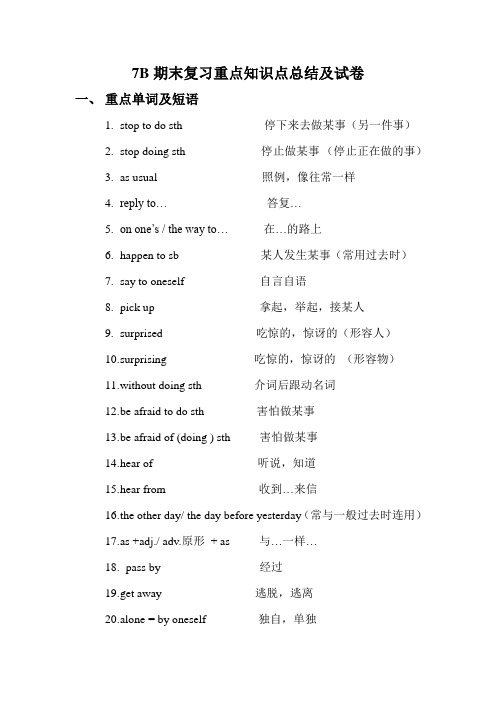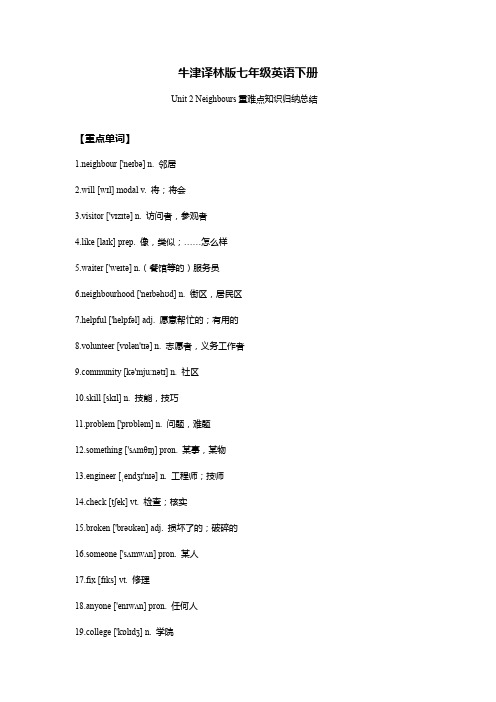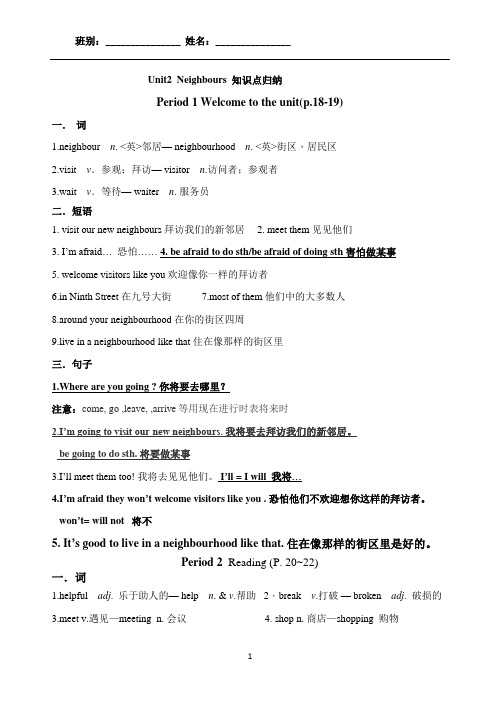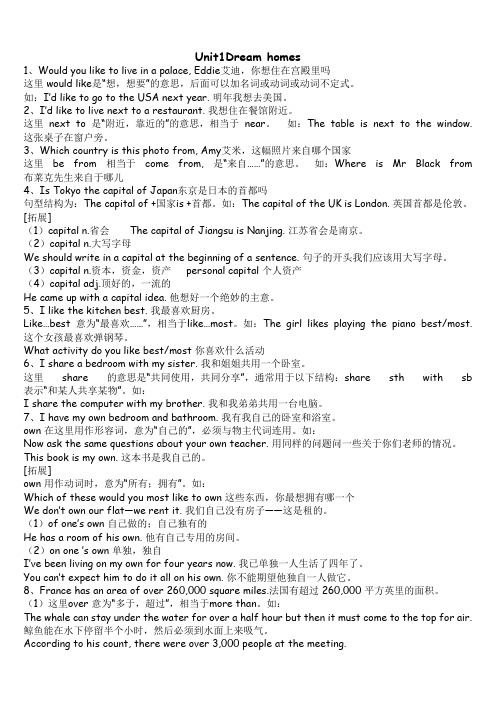牛津译林版七年级下英语知识点总结
- 格式:docx
- 大小:48.61 KB
- 文档页数:40

牛津译林版初中英语七年级下册unit8重点单词、短语、句型、汇总牛津译林版初中英语七年级下册Unit8重点单词、短语、句型、电子书汇总【重点短语】1.bring sb sth./bring sth. to sb.带给某人某物2.how rude you are!你多么粗鲁啊3.like watching the goldfish swim around喜欢看着金鱼游来游去4.sleep on my knees睡在我的膝盖上5.hold it in my hand把它握在我的手里6.feed her carrots/feed carrots to her喂她胡萝卜7.teach sb.( to do )sth.教某人(做)某事8.different kinds of mice不同种类的老鼠9.run after 追赶,追逐10.do wonderful tricks玩精彩的把戏11.build camps out of sticks用树枝搭建帐篷12.never bark or bite从来不叫也不咬13.take good care of /look after.. well好好照顾14.make trouble 制造麻烦15.need a gentle touch需要温柔的抚摸16.look around for 到处找17.be friendly to …对……友好18.make nice sounds发出动听的声音19.be easy to look after很容易照顾20.a special friend of mine我的一个特殊的朋友21.say “Hello!”/goodbye to sb.向某人问好/告别22e back home 回家23.give him dog food 给他狗食24.I don’t agree我不同意25.agree with sb 同意某人26.listen to a talk on/about goldfish听一个关于金鱼的讲座27.pick up goldfish with your hands用你的手拿起金鱼28.pick them up把他们拿起29.put your goldfish in the sun/in clean water把你的金鱼放在太阳底下/放在干净的水里30.weigh up to 40 grams 重达四十克31.feed them once a day 一天喂他们一次32.grow up to be 20 centimeters long长到20厘米长33.join the Pet Club加入宠物俱乐部34.tell me more about告诉我更多关于35..make some/much noise制造些/许多噪音36.walk the dog/take the dog for a walk 遛狗37.brush its fur 刷它的毛38.find information on the Internet在网上找到信息39.be noisy 吵闹【重点句子】1、Bring me my lunch. 把午餐给我带来。

7BU4 Finding the wayWelcome 语言点1. A is +方向of B (A在B的什么方位)上海在南京的东面Shanghai is of Nanjing. =Shanghai is to the east of Nanjing.A is in the +方向of B(A在B里面什么方位)上海在中国的东面Shanghai is of China. 台湾在中国的东南Taiwan is in the southeast of China.美国在加拿大的南面。
The US is (to the) south of Canada.公园在学校的西北面。
The park is (to the) northwest of the school.北京在中国的北部。
Beijing is in the north of China. =Beijing is in the northern part of China.北京在江苏的北面。
Beijing is (to the) north of Jiangsu.山东在江苏的北面。
Shandong is (to the)north of Jiangsu.香港在中国的南部,澳门在香港的西部。
(Hong Kong, Macau)2. Follow me, Eddie. =Come with me. (follow=come/go after)follow sb. to sp. 请跟我到图书馆。
Please follow me to the library.跟我来,我会告诉你路线。
Follow me and I’ll show you the way.冬去春来。
Spring follows winter. 沿着这条街走到公交车站。
Follow the street to the bus stop. 3. Are you sure, Hobo? be sure 确信,有把握(1) be sure to do sth. 表示说话人推测“一定,必然会”。

7B期末复习重点知识点总结及试卷一、重点单词及短语1.stop to do sth 停下来去做某事(另一件事)2.stop doing sth 停止做某事(停止正在做的事)3.as usual 照例,像往常一样4.reply to…答复…5.on one’s / the way to…在…的路上6.happen to sb 某人发生某事(常用过去时)7.say to oneself 自言自语8.pick up 拿起,举起,接某人9.surprised 吃惊的,惊讶的(形容人)10.s urprising 吃惊的,惊讶的(形容物)11.w ithout doing sth 介词后跟动名词12.b e afraid to do sth 害怕做某事13.b e afraid of (doing ) sth 害怕做某事14.h ear of 听说,知道15.h ear from 收到…来信16.t he other day/ the day before yesterday(常与一般过去时连用)17.a s +adj./ adv.原形+ as 与…一样…18.pass by 经过19.g et away 逃脱,逃离20.a lone = by oneself 独自,单独21.t hrough 穿过,通过(空间)go through 通过…22.p ut up 搭,竖立23.c entury ----centuries 世纪,百年24.e xcited/exciting 分别形容人和物25.e nough 足够的(放于名词前,形容词后)be enough to do sth26.t oo… to太…而不能…27.d ecide to do sth 决定做某事28.r each sth 伸手(脚)够到29.f ail to do sth 做某事失败30.s end sb sth= send sth to sb 发送…给…31.b e able to do sth= can/could 能/会做某事32.p ay for…为…付款33.r aise sth for sb 为…筹集/募集…34.r aise sth to do sth 募集…做某事35.s ave…from…从…救出…36.b e badly hurt 伤的很重37.p rotect…from doing sth保护…免于….38.p ut it out 把它扑灭(代词放中间)39.i n hospital 住院40.i n the hospital 在医院41.n od—nodded (过去式)点头42.n ews (不可数) 新闻,消息43.b y the way 顺便说说44.n o problem 没问题45.d o/try one’s best to do sth尽某人最大努力做某事46.c areful---careless(反义词)47.d o well in doing=be good at doing sth 擅长做某事48.a t the age of…在…岁的时候49.r ecommend sb for…推荐某人获得…50.t ake part in 参加(节目,游戏,活动)51.l ose one’s way = get lost迷路52.t each sb (代词用宾格)sth 教…(代词用宾格)53.t each sb to do sth 教某人做某事54.b ark at sb 对某人叫/吠55.l ook after…well=take good care of…照顾好…56.h ave trouble doing sth 做某事很困那/麻烦57.a ll the time 一直,总是58.a gree with sb 同意某人的观点agree to do sth 同意做某事59.w eigh up to…重达…60.g row up 成长,长大61.t alk= speech 演讲(可数)62.n oisy---noisily adv. 嘈杂的/地(变y为i加ly)期末复习试卷一、单项选择1. She is 11-year-old girl and enjoys playing chess.A. an; anB. a; theC. an; /D. the; /2. Everybody is too tired. Let's a rest.A. stop havingB. to stop havingC. stop to haveD. stop to have3. He was to hear of the news this morning.A. surprising; surprisedB. surprised; surprisingC. surprised; surprisedD. surprising; surprising4.She met her old friend the other day.A. on her way to homeB. on her way homeC. in my way homeD. in my way to home5.The big fire in Australia was at last.A. put inB. put outC. put upD. put down6.Lots of students couldn’t hear the teacher on Ding ding(钉钉)A. enough clearlyB. clearly enoughC. enough clearD. clear enough7.The sunshine went the window, so the whole room was bright.A. acrossB. overC. throughD. past8.--- I can’t reach the book on the shelf, can you help me?--- .A. Never mindB. No problemC. That's all rightD. That's OK9.He did n’t ___________ his pen-friend and he missed her very much.A. heard fromB. hear ofC. heard ofD. hear from10.Many people have _ to do because of the disease Corona vi(新型冠状病毒).A. everythingB. somethingC. anythingD. nothing11.Doctor Zhong nanshan says it still _______ long time to cure(治愈) the diseaseA. spendB. costC. payD. take12.The Eiffel Tower, a ____________ tower, is 130 years old this year.A. 324 metres tallB. 324-metres-tallC. 324-metre-tallD. 324-metre tall13.She felt very sad because she ___________ in the middle-term exam.A. reachedB. failedC. hitD. entered14.The small giraffe is too short the leaves on the tree.A. to reachingB. to reachC. reachingD. not to reach15. good news! The doctors found the medicine to cure the disease!A. HowB. What aC. WhatD. How a二、完形填空阅读下面短文,掌握其大意,从每题所给的A. B. C. D四个选项中,选出最佳选项。

7BUnit1 Dream homes1、Would you like to do sth...?肯定回答:Yes, I’d/We’d like/love to否定回答:I’d/We’d like/love to,but...或Sorry,I’m/We’re afraid not...2、next to =near 紧邻,在......近旁3、one 泛指上文提及的同类事物中的一个。
It 特指上文提到的同一个事物4、be from = come from 来自5、the capital of ......的首都/省会6、around the world = in the world = all over the world 在全世界7、enjoy oneself = have a good time = have fun doing sth 做某事很开心8、in the centre of 在......的中心9、share sth with sb = share sb sth 与某人合用/分享某物10、look out向外看look out at sth 向外看某物look out of 向......外看11、have a lot of things to do I have a lot of homework to do.12、foot 复数形式为feet13、have an area of 占......面积14、over = more than 超过15、There be +,名词+ v-ing+地点状语There is a baby sleeping in the room.16、be full of = be filled with 满是......,充满......17、of one’s own 属于某人自己的on one’s own 单独地;独立18、hope to do sth hope sb will/can do sth没有hope sb to do sth19、some day 将来的某一天,总有一天20、常用的电话用语:Who's speaking,please?请问你是哪位? Is that ... ( speaking)?你是......吗?This is ... ( speaking).我是...... May I speak to..?.我能和....通电话吗?21、take a message 传个话22、ask sb. (not) to do sth. 要求某人(不要)做某事23、call sb back 给某人回电话24、double adj 双的,两倍的25、one of +名词复数26、at the foot of 在......脚下27、in front of 在...外部的前面in the front of 在...内部的前面28、on the ground floor 在一楼29、more than 多于less than 少于30、invite sb(not)to do sth邀请某人(不要)做某事invite sb to some place邀请某人去某地31、each of us = we each 我们每个人32、in town在城里33、a cup of tea一杯茶34、living room客厅dining room餐厅35、washing machine洗衣机36、a football field 一个足球场37、have parties 举行聚会38、more than enough足够多,太多39、in bed躺在床上in the bed在床上40、square metre平方米41、the best place to chat and watch TV 聊天和看电视最好的地方42、home cinema家庭影院43、(be)different from 与...不同反: (be ) the same as... 与......相同44、a swimming pool 游泳池45、at the weekend = on weekends在周末46、listen to sth.听某事物47、like sth best最喜欢某物48、live in.. 住在....49、after dinner晚饭后50、watch TV看电视51、chat with sb.和某人聊天52、in size在尺寸上53、telephone number电话号码54、love to do sth. love doing sth. 喜爱做某事55、I like to do sth. like doing sth. 喜欢做某事56、would like to do sth.愿意做某事would like sb. to do sth.想要某人做某事57、Thanks for doing sth.=Thank you for doing sth. 感谢你做某事。

一、知识要点1.Where are you going?你打算去哪里?be going此处为“现在进行时表将来”。
现在进行时表将来主要用于表示按计划或安排将要发生的动作,常有“意图”“安排”或“打算”的含义。
这种现在进行时比较生动,给人一种期待感。
go, come, leave等表示位移的动词,都可以用于现在进行时表将来。
例如:He is going. 他要走了。
I’m coming. 我要来了。
Tom is leaving. 汤姆要走了。
2. I’m going to vi sit our new neighbours.我打算拜访我们的新邻居。
be going to意为“计划,打算”,后接动词原形,用于表将来。
例如:I’m going to wash the car if I have time. 若有时间我想洗洗车。
Where are we going to stay tonight? 我们今晚住哪里?3. I’m afraid they won’t welcome visitors like you.恐怕他们不会欢迎像你一样的拜访者。
(1)welcome作及物动词,意为“欢迎’’,可与介‘词to连用;也可作形容词,意为“受欢迎的"。
如:Welcome you to our school! 欢迎到我们学校来!You’re welcome.不用谢。
(2)句中like是介词,意为“像,相似’’,其反义词是unlike;作动词时,意为“喜欢’’,后可接动名词或不定式作宾语。
如:What is Jim like? 吉姆这个人怎么样?They like playing football on Sunday.他们喜欢在星期天踢足球。
(3)won’t是will与not的缩略形式。
“will+动词原形"也是一般将来时的构成之一。
如:We will take a bus to work.我们将乘公共汽车上班。

Unit 8 Pets知识点复习一、知识点详解1.bring me something to eat =bring something to eat to me给我一些吃的(bring sb sth=bring sth to sb) to 侧重朝着,向着,对着某人;(get sb sth=get sth for sb ) for 侧重强调动作的受益者,为了某人,替某人。
常见此类双宾语动词:①可转换成to 的动词:take / send / lend / give / pass / hand / show / tell / w ish / write / teach feed②可转换成for的动词:buy / get / make / cook / build / draw / choose / prepare / spare / sing / save / order / find2. say “ please” / “ hello ”/ “sorry”(to sb) 对某人说“请”-----①say 说,强调说话内容,及物动词带宾语或句子。
也可作不及物动词,。
Eg.It’s hard to say. say to sb (oneself) 自言自语②speak强调单方的“说”或“讲”,一般用作不及物动词,要表示“对某人说(某事)”,可用speak to [with] sb (about sth)。
可接语言的名词,eg: speak English③tell tell 表示“告诉”,可接双宾语,双宾语易位时用介词to 引出间接宾语。
④talk talk 强调双方“交谈”,一般用作不及物动词,表示“同某人谈论(某事)”,可用talk to [with] sb (about sth)。
如:3.watch them swim around看他们游来游去hear birds singwatch / see / hear / listen to / notice sb do sth” 是指看见某人做过某事”是看着事情的发生全过程,hear someone calling / shouting for helpwatch / see / hear / listen to / notice sb doing doing sth是指”看见某人正在做某事”,表正在进行4. teach parrots to speak 教鹦鹉说话teach sb to do sth 教某人做某事teach sb sth =teach sth to sb 教某人--teach sb how to do sth教某人如何做某事5.the cleverest animal of all 最聪明的动物the biggest restraunt in Tifth Street五大街上最大的餐馆6.wonder n. 奇迹v.想知道wonderful adj 精彩的wonderfully adv 精彩地7.build me camps out of sticks 用树枝造……①常见短语:build ----out of 用---建造---make a bird out of wood make ---out of 用---制作---take a watch out of its pocket take …out of 从-----中取出----helpMrs Sun out (of the fire ) help…out of 帮----从中逃离get …out of②build sb sth = build sth for sb 替某人建造----※※unt with eyes open wide 睁大眼睛寻找do sth with eyes open wide睁大眼睛做某事with复合结构表动作的伴随,通常为:①with +n+adj sleep with eyes closed / open ;②with +n+prep come in with a big smile on one’s facego to school with a big bag on one’s backleave the office with lights on / off8.till the end直到最后eg look after him till the endnot ------till 直到----才eg. do / does / did / will not do homework till 9.pm don’t have to do = don’t need to do 不必做某事9. look around环顾四周常见与look搭配的短语look up/down 朝上/ 下看look after照顾look for寻找look out当心/ 朝外看look out of sth朝------外看look out at sth眺望---look at朝------看look adj 看上去/ 看起来-----look like sth看上去/ 看起来像-----10.be afraid of 害怕be afraid to do害怕做某事be afraid that 恐怕,担心---[来源:学&科&网11.There’s nothing wrong with keeping a snake if you like.如果你喜欢,养蛇并没有错。

牛津译林英语七年级下册全册知识点汇总7B Unit11.would like 的用法①would like意为“想要”,相当于want,没有人称和数的变化。
其后常接动词不定式(即todo形式),表示“想做某事”。
①Would you like to do sth.?意为“你(们)愿意/想做某事吗?”,常用于有礼貌地提出邀请、请求或建议。
I would like to help you.我愿意帮你。
Would you like to watch the basketball game with me?你愿意和我一起观看这场篮球比赛吗?①后接名词或代词,表示“想要某物”。
My mother would like an apple. 我妈妈想要个苹果。
④ would like sb.to do sth.想要某人做基事。
I'd like you to meet them. 我想要你见见他们。
⑤Would you like.?意为“你(们)想要……吗?”,表示向对方提出客气的、有礼貌的请求、邀请、希望或询回等。
Would you like a cup of tea?你想来杯茶吗?2.next to方位介词短语,意为“紧靠,紧邻,在……近旁”,后面直接加名词或代词,在句中作地点状语或表语。
Tom lives next to Daniel.汤姆住在丹尼尔隔壁。
Our class is next to theirs.我们班与他们班紧邻。
next to=beside,意为“在……旁边”。
My home is next to our school.=My home is beside our school.我家靠近我们的学校。
3.in town 在城里,在镇上in the town 在这座城里,the 表示特指4.Your watch is very beautiful.I want to buy one,too. 你的手表很漂亮,我也想买一块。

牛津译林版七年级下册Unit4 Finding your way1.Let’s go down here.让我们一起下去吧。
go down 下降,沉没,屈服,被记下At sunset, the sun looks as if it is going down.日落时,太阳看起来好像在降落。
Go down to the grocer’s and get some sugar.去杂货店给我买点糖来。
2.Don’t be afraid. Come with me.不要害怕。
跟着我来。
Don’t be afraid to pet the dog.不要害怕抚摸这条狗。
3.I think we have to go up again.我觉得我们必须再次上去了。
have to 不得不,必须We’ll have to change the bulb again.我们又得换个灯泡了。
与must 的区别:have to 通俗用语,指受客观条件或环境迫使而“不得不”做某事,突出客观性。
must 通常表示命令或说话人主观认为必须要做某事,含强调语气,侧重主观性。
I have to have someone to look after.我必须去照顾某人。
Then you must be my cousin.那么你一定是我的远亲了。
go up 增长,建起,炸毁Go up to the fork and turn left.走到岔口处向左拐。
Production is going up in leaps and bounds.产量飞速增长。
4.Sunshine Zoo is north of Sunshine Middle School.阳光动物园在阳光中学的北面。
be + 方位词+ of ... (某地)在(另一地)的......方向Our school is south of the zoo.我们学校在动物园的南面。
英语中东南、东北、西南和西北的表达分别是south-east, north-east, south-west, north-west。

Unit 7 AbilitiesComic strip1.Believe it or not!信不信由你(P80)(1)believe it or not意思是”信不信由你“,是由whether you believe it or not变化而来,通常放在句首,后面加逗号,再接主句。
Believe it or not,I am feeling homesick now.信不信由你,我现在想家了。
(2)believe此处是及物动词,意思是相信,后加名词,代词作宾语,也可以跟that等引导的宾语从句。
You can’t believe anything she says.你不能相信她说的任何事情。
It’s hard to believe that he is only 10.很难相信他只有10岁。
(拓展)believe sb意思是“相信某人‘(所说的是真的),believe in sb信任某人2.Look out,Eddie!埃迪,当心!(P80)Look out意思是”留神,当心,小心“多用于口语中,提醒注意安全,Look out! The car is coming. 注意,车来了。
Look out!The water is too deep. 注意,水太深了。
(拓展)take care和be careful也有“小心,当心,注意”的意思3.People have different abilities.人们有不同的能力。
(p80)ability 此处是可数名词,表示“能力”不同种类的能力,复数形式是abillities,,形容词形式是able,意思是“有能力的,(have)the ability to do sth意思是(有)做某事的能力。
I think Tom has the ability to be our monitor.我认为汤姆有当班长的能力。
He is a man of ability.他是一位有能力的人。

七年级英语下册知识点总结Unit 1 Dream homes一、重点词组、句型1、Would you like to live in the palace, Eddie? 埃迪,你想住宫殿里吗?①Would you like sth? 肯定回答:Yes, please. 否定回答:No, thanks.②Would you like to do sth? 肯定回答:Yes, I’d like/love to. 否定回答:I’d like/love to, but,2、There are twenty restaurants in town. 镇上有二十家餐馆。
There are about 8,000,000 people living in London. 大约有八百万人住在伦敦。
①表示某地有,,,用there be 句型,谓语动词就近原则。
There __________(be) an art room, a music room and two computer rooms in our school.②表示有事情要做,用there be sth to do。
There are lots of things ___________(see) in Beijing..③表示有某人正在做某事,用there be sb doing sth.。
On game shows, there are always famous people___________(talk) about their lives.3、I live in a town 15 miles from London. 我住在离伦敦15英里的一个镇上。
be far (away) from 离,,远,但出现具体距离时,不用farMy home is __________________from the school.My home is 5 kilometres ___________from the school. A. away B. far C. close D. next to 4. have fun with sb./sth. 和某人/某物玩得开心have fun doing sth. 做某事很开心have(has/had) fun= have(has/had) a good time= enjoy(enjoyed) onself(myself/yourself/youselves,,)5、I also have a bedroom of my own. =I also have my own bedroom. 我也有自己的房间。

牛津译林版七年级英语下册全册重点知识点归纳汇总牛津译林版七年级英语下册Unit1重点知识点归纳Unit 1 Dream homes【重点单词】1.palace ['pælɪs] n. 皇室,宫殿2.town [taʊn] n. 镇,城镇3.Canada ['kænədə] n. 加拿大4.France [frɑːns] n. 法国5.Japan [dʒə'pæn] n. 日本6.Russia ['rʌʃə] n. 俄罗斯7.London ['lʌndən] n. 伦敦8.country ['kʌntri] n. 国家9.capital ['kæpɪtl] n. 首都e [maɪl] n. 英里11.garden ['gɑːdn] n. 花园,果园12.flat [flæt] n. 公寓13.centre ['sentə] n. 中心14.share [ʃeə] vt. 合用;分享15.bedroom ['bedrʊm] n. 卧室16.own [əʊn] adj. 自己的17.bathroom ['bɑːθruːm] n. 浴室18.balcony ['bælkəni] n. 阳台19.beach [biːtʃ] n. 海滩20.sea [siː] n. 海21.zero ['zɪərəʊ] num. 零22.hundred ['hʌndrəd] num. 百23.thousand ['θaʊzənd] num. 千lion ['mɪljən] num. 百万25.foot [fʊt] n. (pl. feet) 英尺26.square [skweə] adj. 平方的27.metre ['miːtə] n. 米,公尺28.area ['eərɪə] n. 面积29.over ['əʊvə] prep. 超过30.fork [fɔːk] n. 餐叉31.fridge [frɪdʒ] n. 冰箱32.knife [naɪf] n. (pl. knives)刀mp [læmp] n. 灯;台灯34.shower ['ʃaʊə] n. 淋浴35.sofa ['səʊfə] n. 沙发36.video ['vɪdɪəʊ] n. 录像37.may [meɪ] modal v. 可以;也许,可能38.message ['mesɪdʒ] n. 消息,音信39.double ['dʌbl] adj. 双的;两倍的40.study ['stʌdi] n. 书房41.machine [mə'ʃiːn] n. 机器42.field [fiːld] n. 田,地43.invite [ɪn'vaɪt] vt. 邀请44.stay [steɪ] vi. 停留,逗留【重点短语】1.be full of 充满2.of one’s own 某人自己的3.some day 某天4.take a message 传口信5.call sb. back 给某人回电话6.football field 足球场7.at the foot of 在……脚下8.washing machine 洗衣机9.dream homes 梦想家园10.live next to the restaurant 住在饭店隔壁11.the capital of Japan 日本的首都12.in the town/the city/the country 在镇上/市里/农村13.three students from different countries 来自不同国家的三个学生14.a flat in the center of Moscow 莫斯科中心的一套公寓15.have fun with my dog 和我的狗玩得高兴16.have fun (in) doing sth. 做某事很愉快17.share a bedroom with sb. 与某人共享一个卧室18.have my own room 有我自己的房间19.look out at the beach 眺望海滩20.cook meals 煮饭21.have an area of… 有……的面积22.make a video 制作一个视频23.send sb. sth. 把某物寄送给某人24.invite sb. to do sth. 邀请某人去做某事25.more than enough food 绰绰有余的食物【重点句型】1.Would you like to live in a palace?你愿意住在一个宫殿里吗?2.The capital of Japan is Tokyo.日本的首都是东京。

七年级英语下册知识点总结Unit 1 Dream homes一、重点词组、句型1、Would you like to live in the palace, Eddie? 埃迪,你想住宫殿里吗?①Would you like sth? 肯定回答:Yes, please. 否定回答:No, thanks.②Would you like to do sth? 肯定回答:Yes, I’d like/love to. 否定回答:I’d like/love to, but…2、There are twenty restaurants in town. 镇上有二十家餐馆。
There are about 8,000,000 people living in London. 大约有八百万人住在伦敦。
①表示某地有……,用there be 句型,谓语动词就近原则。
There __________(be) an art room, a music room and two computer rooms in our school.②表示有事情要做,用there be sth to do。
There are lots of things ___________(see) in Beijing..③表示有某人正在做某事,用there be sb doing sth.。
On game shows, there are always famous people___________(talk) about their lives.3、I live in a town 15 miles from London. 我住在离伦敦15英里的一个镇上。
be far (away) from 离……远,但出现具体距离时,不用farMy home is __________________from the school.My home is 5 kilometres ___________from the school. A. away B. far C. close D. next to 4. have fun with sb./sth. 和某人/某物玩得开心have fun doing sth. 做某事很开心have(has/had) fun= have(has/had) a good time= enjoy(enjoyed) onself(myself/yourself/youselves……)5、I also have a bedroom of my own. =I also have my own bedroom. 我也有自己的房间。

7BUnit4 Finding your way 知识点汇总一、Comic strip and Welcome to the unit.1. follow me 跟我来【=come with me】【拓展】following 形容词:接下来的、以下的the following week = the next week 下一周2. Are you sure?你确定吗?【复习】be sure 用法:(1)be sure of/about sth. (2)be sure to do sth.(3)be sure +(that)宾从3.Let's go on a trip. 让我们去旅行。
【重点】go on a trip to sp. = travel to sp. = go to sp. for a trip 去某地旅行4.have to go up again 不得不再上去5.Sunshine Zoo is north of Sunshine Middle School.【重点】表示“A在B的东/南/西/北面"用句型:A is east/south/west/north of B其同义句是(另一种表达方式):A is to/on the east/south/west/north of BEg: Nanjing is west of Shanghai=Nanjing is to the west of Shanghai表示方位的介词in.on与to的区别:(1)in 表示A在B的范围之内,Jiangsuis in_the south ofChina.江苏在中国南部。
(2)to 表示两者不接壤,在范围以外,不是从属关系:Japanis to the east ofChina. 日本在中国东面.(3)on 表示两地接壤,在范围以外,不是从属关系:Russia is on the north ofChina. 俄罗斯在中国北面。


江苏专版译林七下U6知识点总结1.I want to go riding. 我想去骑马。
解析:go riding为动词短语,意为“去骑马”,为“go + v.ing”结构,常指一些户外活动。
Riding,名词,意为“骑马”,相当于horse riding。
如:➢ At Christmas you can go riding to enjoy the view.在圣诞节你可以骑马欣赏风景。
➢ Riding is her favourite sport.骑马是她最喜欢的体育运动。
拓展:ride,动词,意为“骑(马、自行车等)”。
固定短语:ride a horse骑马;ride a bicycle骑自行车。
如:➢ Can you ride a horse?你会骑马吗?2.Hurry up,Eddie. 快点,埃迪解析:hurry,动词,意为“急忙,匆忙”。
hurry up意为“快点,赶快”,常用于祈使句,不能用于否定句中。
常用短语:hurry to someplace 急忙赶往某地;hurry (up) to do sth 急忙做某事。
如:➢ Hurry up, or you'll be late for class.快点,否则你上课要迟到了。
➢ She hurried to the airport.她急忙去机场。
➢ They hurried to see if everything was OK.他们急忙去看一切是否正常。
拓展:① hurry 还可作名词,意为“匆忙;仓促;急忙”,固定短语in a hurry意为“匆忙地”。
如:➢ He was in a hurry to leave.他匆忙地要离开。
② hurry off/away意为“匆匆离开”。
如:➢ Miss Zhao hurried off to look after the man.赵老师匆匆离开去照看那个男人。
3.Outdoor fun 户外乐趣解析:outdoor,形容词,意为“户外的",在句中只能作定语。

牛津译林版七年级英语下册Unit1知识点归纳<重要短语>1.live in a palace 住在一个宫殿里2.the capital of.. .的首都3. share sth. with sb.与某人合用/分享某物4.in size 在尺寸上5. be full of 满是6. some day 将来有一天,总有一天7. call sb. back 回电话8.next to 紧邻,在...近旁9. in the centre of 在...的中心10.look out at 向外眺望11.be different from 与...与众不同12. of one’s own 属于某人自己的13.take a message 传个话,捎个口信14.at the foot of 在...的脚下<重要句型>1.--Would you like to live in a palace, Eddie?埃迪,你想住宫殿吗?--No. I’d like to live ne xt to a restaurant.不。
我想住在饭店旁边。
2.Is Tokyo the capital of Japan ?东京是日本的首都吗?3.I always have fun with my dog there.我总是和我的狗在那里玩得很开心。
4.I share a bedroom with my sister.我和妹妹同住一间卧室。
5.I love to sit there and look out at the beach and the sea. 我喜欢坐在那儿,向外眺望海滩和大海。
6.Hello. May I speak to Daniel, please?您好。
我可以和丹尼尔通电话吗?7.--Who is speaking, please? 请问你是谁?--This is Simon. 我是西蒙。

Unit2 Neighbours 知识点归纳Period 1 Welcome to the unit(p.18-19)一.词1.neighbour n. <英>邻居— neighbourhood n. <英>街区,居民区2.visit v.参观;拜访— visitor n.访问者;参观者3.wait v.等待— waiter n. 服务员二.短语1. visit our new neighbours 拜访我们的新邻居2. meet them 见见他们3. I’m afraid… 恐怕……4. be afraid to do sth/be afraid of doing sth 害怕做某事5. welcome visitors like you欢迎像你一样的拜访者6.in Ninth Street 在九号大街7.most of them 他们中的大多数人8.around your neighbourhood 在你的街区四周9.live in a neighbourhood like that 住在像那样的街区里三.句子1.Where are you going ? 你将要去哪里?注意:come, go ,leave, ,arrive等用现在进行时表将来时3.I’ll meet them too! 我将去见见他们。
I’ll = I will 我将…4.I’m afraid they won’t welcome visitors like you . 恐怕他们不欢迎想你这样的拜访者。
won’t= will not 将不5. It’s good to live in a neighbourhood like that. 住在像那样的街区里是好的。
Period 2 Reading (P. 20~22)一.词1.helpful adj. 乐于助人的— help n. & v.帮助 2.break v.打破— broken adj. 破损的3.meet v.遇见—meeting n. 会议 4. shop n. 商店—shopping 购物二.短语1.some of them 他们中的一些人2.meet at the community centre 在社区中心见面3.share their different skills 分享他们的不同技能4. help us with all kinds of problems 帮助我们解决各种的问题help sb. with sth. 帮助某人做某事5.have a “helping hands” meeting 举行“援助之手”见面会6.ask sb. (not) to do 要某人(不要)做某事7.ask someone to fix it 请某人修理它8. some college students 一些大学生9.be ready to help 乐意帮忙 be ready to do sth. 乐意做某事10.really nice 真好 11.help visit the old people 帮助看望老人12.do some shopping for them 为他们购物13.help the old people clean their flats 帮助老人打扫他们的公寓14.help the boy with his homework 帮助这个男孩做家庭作业15.fix things like broken bicycles 修理像坏了的自行车那样的物品16.need help with one’s problem 某人遇到问题需要帮助17.get help with one’s homework 某人作业得到帮助18.among the volunteers 在志愿者中二.句子1. What are your neighbours like? 你的邻居们怎么样? What be …like ? ...怎么样?2. They’re kind and helpful. 他们友好又乐于助人。

Unit1Dream homes1、Would you like to live in a palace, Eddie艾迪,你想住在宫殿里吗这里 would like是“想,想要”的意思,后面可以加名词或动词或动词不定式。
如:I’d like to go to the USA next year. 明年我想去美国。
2、I’d like to live next to a restaurant. 我想住在餐馆附近。
这里next to 是“附近,靠近的”的意思,相当于near。
如:The table is next to the window. 这张桌子在窗户旁。
3、Which country is this photo from, Amy艾米,这幅照片来自哪个国家这里be from 相当于come from, 是“来自……”的意思。
如:Where is Mr Black from 布莱克先生来自于哪儿4、Is Tokyo the capital of Japan东京是日本的首都吗句型结构为:The capital of +国家is +首都。
如:The capital of the UK is London. 英国首都是伦敦。
[拓展](1)capital n.省会The capital of Jiangsu is Nanjing. 江苏省会是南京。
(2)capital n.大写字母We should write in a capital at the beginning of a sentence. 句子的开头我们应该用大写字母。
(3)capital n.资本,资金,资产personal capital 个人资产(4)capital adj.顶好的,一流的He came up with a capital idea. 他想好一个绝妙的主意。
5、I like the kitchen best. 我最喜欢厨房。
牛津译林版七年级下英语知识点总结1."Would you like to do something?"Positive answer: "Yes。
I'd/we'd like/love to."Negative answer: "I'd/we'd like/love to。
but。
" or "Sorry。
I'm/We're afraid not."2."Next to" means near or beside.3."One" refers to any one of the same type of thing ned earlier。
"It" refers to the same thing ned earlier.4."Be from" means to come from.5."The capital of" refers to the capital or provincial capital ofa place.6."Around the world," "in the world," and "all over the world" all mean globally.7."Enjoy oneself," "have a good time," and "have fun doing something" all mean to have a good experience doing something.8."In the centre of" means in the middle of.9."Share something with someone" means to use or enjoy something together.10."Look out" means to look outside。
"Look out at something" means to look at something outside。
"Look out of" means to look outside from inside.11."Have a lot of things to do" means to have many tasks to complete.12."Foot" es "feet" in plural form.13."Have an area of" means to occupy a certain amount of space.14."Over" means more than.15."There be + noun + verb-ing + n adverb" means that something exists in a particular n doing a particular n。
For example。
"There is a baby sleeping in the room."16."Be full of" and "be filled with" both mean to have a lot of something or to be completely covered by something.17."Of one's own" means belonging to oneself。
"On one's own" means alone or independently.18."Hope to do something" means to want to do something。
"Hope someone will/can do something" is correct。
but "hope someone to do something" is incorrect.19."Some day" means someday in the future.mon telephone phrases include:1."Who's speaking。
please?" can be changed to "May I know who I'm speaking with?"2."Is that。
( speaking)?" can be changed to "Are you。
"3."This is。
( speaking)." can be kept as is.4."May I speak to。
" can be changed to "Could I talk to。
"5."Take a message" can be kept as is.6."Ask sb。
(not) to do sth." can be kept as is.7."Call sb back" can be kept as is.8."Doubleadj" can be changed to "Twice the amount of。
"9."One of +名词复数" can be kept as is.10."At the foot of" can be kept as is.11."In front of" can be divided into two separate points: "In front of" and "In the front of".12."On the ground floor" can be kept as is.13."More than" and "less than" can be kept as is.14."Invite sb (not) to do sth" can be kept as is。
but "invite sb to some place" can be changed to "invite sb to go somewhere".15."Each of us = we each" can be kept as is.16."In town" can be kept as is.17."A cup of tea" can be kept as is.18."Living room" and "dining room" can be kept as is.19."Washing machine" can be kept as is.20."A football field" can be kept as is.21."Have parties" can be changed to "Throw parties".22."More than enough" can be kept as is.23."In bed" and "in the bed" can be divided into two separate points.24."Square metre" can be kept as is.25."The best place to chat and watch TV" can be kept as is.26."Home cinema" can be kept as is.27."(Be) different from" can be kept as is.28."A swimming pool" can be kept as is.29."At the weekend" can be changed to "On the weekend".30."Listen to sth" can be kept as is.31."Like sth best" can be changed to "Prefer something the most".32."Live in" can be kept as is.33."After dinner" can be kept as is.34."Watch TV" can be kept as is.35."Chat with sb" can be kept as is.Unit 2: Neighbours1.A community centre is a place for people in a neighbourhood to gather.2.Most of the people in the neighbourhood go to the community centre.3.The community centre offers all kinds of activities for people in the neighbourhood.4.They have meetings at the community centre.5.People go to the centre on weekends to do some shopping.6.The community centre also helps sick people in the neighbourhood.7.They have a meeting the day after tomorrow.8.They can make a fire to keep warm.9.The community centre is far away from some people's homes.10.They talk about what they want to do in the future.11.The meeting begins with an n.12.People feel well or better after going to the community centre.13.Some people worry about the safety of the neighbourhood.14.Many office workers live in the neighbourhood.15.There is a police n and a post office nearby.16.People often gather at the community centre at night.17.They had a meeting on the afternoon of 5th March.18.People should get to know their neighbours and help each other around the neighbourhood.19.College students can also get involved in the community centre.20.People wait for others to join the community centre.21.They give each other ideas on how to improve the neighbourhood.24.I know a lot about different cultures and ns from around the world.25.Tom is a computer engineer。